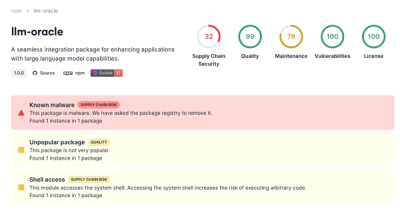Useful utilities for working with Uint8Array (and Buffer)
It's time to transition from Buffer to Uint8Array, and this package helps fill in the gaps.
Note that Buffer is a Uint8Array subclass, so you can use this package with Buffer too.
This package is tree-shakeable and browser-compatible.
This package also includes methods to convert a string to Base64 and back.
Note: In the browser, do not use globalThis.atob() / globalThis.btoa() because they do not support Unicode. This package does.
Install
npm install uint8array-extras
Usage
import {concatUint8Arrays} from 'uint8array-extras';
const a = new Uint8Array([1, 2, 3]);
const b = new Uint8Array([4, 5, 6]);
console.log(concatUint8Arrays([a, b]));
API
isUint8Array(value: unknown): boolean
Check if the given value is an instance of Uint8Array.
Replacement for Buffer.isBuffer().
import {isUint8Array} from 'uint8array-extras';
console.log(isUint8Array(new Uint8Array()));
console.log(isUint8Array(Buffer.from('x')));
console.log(isUint8Array(new ArrayBuffer(10)));
assertUint8Array(value: unknown)
Throw a TypeError if the given value is not an instance of Uint8Array.
import {assertUint8Array} from 'uint8array-extras';
try {
assertUint8Array(new ArrayBuffer(10));
} catch (error) {
console.error(error.message);
}
toUint8Array(value: TypedArray | ArrayBuffer | DataView): Uint8Array
Convert a value to a Uint8Array without copying its data.
This can be useful for converting a Buffer to a pure Uint8Array. Buffer is already an Uint8Array subclass, but Buffer alters some behavior, so it can be useful to cast it to a pure Uint8Array before returning it.
Tip: If you want a copy, just call .slice() on the return value.
concatUint8Arrays(arrays: Uint8Array[], totalLength?: number): Uint8Array
Concatenate the given arrays into a new array.
If arrays is empty, it will return a zero-sized Uint8Array.
If totalLength is not specified, it is calculated from summing the lengths of the given arrays.
Replacement for Buffer.concat().
import {concatUint8Arrays} from 'uint8array-extras';
const a = new Uint8Array([1, 2, 3]);
const b = new Uint8Array([4, 5, 6]);
console.log(concatUint8Arrays([a, b]));
areUint8ArraysEqual(a: Uint8Array, b: Uint8Array): boolean
Check if two arrays are identical by verifying that they contain the same bytes in the same sequence.
Replacement for Buffer#equals().
import {areUint8ArraysEqual} from 'uint8array-extras';
const a = new Uint8Array([1, 2, 3]);
const b = new Uint8Array([1, 2, 3]);
const c = new Uint8Array([4, 5, 6]);
console.log(areUint8ArraysEqual(a, b));
console.log(areUint8ArraysEqual(a, c));
compareUint8Arrays(a: Uint8Array, b: Uint8Array): 0 | 1 | -1
Compare two arrays and indicate their relative order or equality. Useful for sorting.
Replacement for Buffer.compare().
import {compareUint8Arrays} from 'uint8array-extras';
const array1 = new Uint8Array([1, 2, 3]);
const array2 = new Uint8Array([4, 5, 6]);
const array3 = new Uint8Array([7, 8, 9]);
[array3, array1, array2].sort(compareUint8Arrays);
uint8ArrayToString(array: Uint8Array, encoding?: string = 'utf8'): string
Convert a Uint8Array to a string.
- Parameter:
encoding - The encoding to convert from.
Replacement for Buffer#toString(). For the encoding parameter, latin1 should be used instead of binary and utf-16le instead of utf16le.
import {uint8ArrayToString} from 'uint8array-extras';
const byteArray = new Uint8Array([72, 101, 108, 108, 111]);
console.log(uint8ArrayToString(byteArray));
const zh = new Uint8Array([167, 65, 166, 110]);
console.log(uint8ArrayToString(zh, 'big5'));
const ja = new Uint8Array([130, 177, 130, 241, 130, 201, 130, 191, 130, 205]);
console.log(uint8ArrayToString(ja, 'shift-jis'));
stringToUint8Array(string: string): Uint8Array
Convert a string to a Uint8Array (using UTF-8 encoding).
Replacement for Buffer.from('Hello').
import {stringToUint8Array} from 'uint8array-extras';
console.log(stringToUint8Array('Hello'));
uint8ArrayToBase64(array: Uint8Array, options?: {urlSafe: boolean}): string
Convert a Uint8Array to a Base64-encoded string.
Specify {urlSafe: true} to get a Base64URL-encoded string.
Replacement for Buffer#toString('base64').
import {uint8ArrayToBase64} from 'uint8array-extras';
const byteArray = new Uint8Array([72, 101, 108, 108, 111]);
console.log(uint8ArrayToBase64(byteArray));
base64ToUint8Array(string: string): Uint8Array
Convert a Base64-encoded or Base64URL-encoded string to a Uint8Array.
Replacement for Buffer.from('SGVsbG8=', 'base64').
import {base64ToUint8Array} from 'uint8array-extras';
console.log(base64ToUint8Array('SGVsbG8='));
stringToBase64(string: string, options?: {urlSafe: boolean}): string
Encode a string to Base64-encoded string.
Specify {urlSafe: true} to get a Base64URL-encoded string.
Replacement for Buffer.from('Hello').toString('base64') and btoa().
import {stringToBase64} from 'uint8array-extras';
console.log(stringToBase64('Hello'));
base64ToString(base64String: string): string
Decode a Base64-encoded or Base64URL-encoded string to a string.
Replacement for Buffer.from('SGVsbG8=', 'base64').toString() and atob().
import {base64ToString} from 'uint8array-extras';
console.log(base64ToString('SGVsbG8='));
uint8ArrayToHex(array: Uint8Array): string
Convert a Uint8Array to a Hex string.
Replacement for Buffer#toString('hex').
import {uint8ArrayToHex} from 'uint8array-extras';
const byteArray = new Uint8Array([72, 101, 108, 108, 111]);
console.log(uint8ArrayToHex(byteArray));
hexToUint8Array(hexString: string): Uint8Array
Convert a Hex string to a Uint8Array.
Replacement for Buffer.from('48656c6c6f', 'hex').
import {hexToUint8Array} from 'uint8array-extras';
console.log(hexToUint8Array('48656c6c6f'));
getUintBE(view: DataView): number
Read DataView#byteLength number of bytes from the given view, up to 48-bit.
Replacement for Buffer#readUintBE
import {getUintBE} from 'uint8array-extras';
const byteArray = new Uint8Array([0x12, 0x34, 0x56, 0x78, 0x90, 0xab]);
console.log(getUintBE(new DataView(byteArray.buffer)));
indexOf(array: Uint8Array, value: Uint8Array): number
Find the index of the first occurrence of the given sequence of bytes (value) within the given Uint8Array (array).
Replacement for Buffer#indexOf. Uint8Array#indexOf only takes a number which is different from Buffer's indexOf implementation.
import {indexOf} from 'uint8array-extras';
const byteArray = new Uint8Array([0x12, 0x34, 0x56, 0x78, 0x90, 0xab, 0xcd, 0xef]);
console.log(indexOf(byteArray, new Uint8Array([0x78, 0x90])));
includes(array: Uint8Array, value: Uint8Array): boolean
Checks if the given sequence of bytes (value) is within the given Uint8Array (array).
Returns true if the value is included, otherwise false.
Replacement for Buffer#includes. Uint8Array#includes only takes a number which is different from Buffer's includes implementation.
import {includes} from 'uint8array-extras';
const byteArray = new Uint8Array([0x12, 0x34, 0x56, 0x78, 0x90, 0xab, 0xcd, 0xef]);
console.log(includes(byteArray, new Uint8Array([0x78, 0x90])));



